The Ladykillers
 for language including sexual references.
for language including sexual references.
Reviewed by: Chris Monroe
STAFF WRITER
| Moral Rating: | Very Offensive |
| Moviemaking Quality: |
|
| Primary Audience: | Adults |
| Genre: | Comedy and Crime/Gangster |
| Length: | 1 hr. 44 min. |
| Year of Release: | 2004 |
| USA Release: |
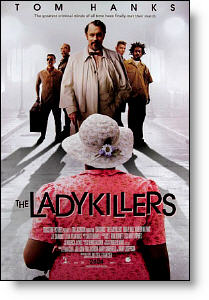
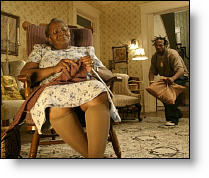
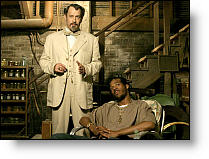
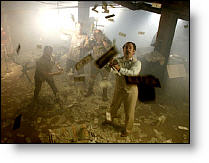
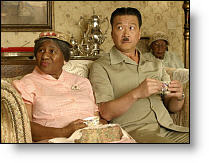
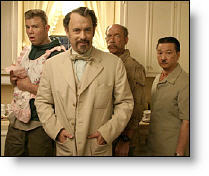
| Featuring |
|---|
|
Tom Hanks Marlon Wayans Irma P. Hall Ryan Hurst Stephen Root |
| Director |
|
Joel Coen — “Bad Santa,” “Intolerable Cruelty,” “O Brother, Where Art Thou?,” “The Big Lebowski” Ethan Coen—“The Big Lebowski” |
| Producer |
| Joel Coen, Ethan Coen, Tom Jacobson, Barry Josephson, Barry Sonnenfeld |
| Distributor |
Here’s what the distributor says about their film: “Academy Award®-winner Tom Hanks teams up for the first time with Academy Award®-winning filmmakers Joel and Ethan Coen (“O Brother, Where Art Thou?”) for this retelling of the critically acclaimed 1955 comedy, “The Ladykillers.” Hanks stars as Goldthwait Higginson Dorr III, Ph.D., a charlatan professor who’s assembled a gang of “experts” for the heist of the century. The thieves: experts in explosions, tunneling, and muscle, and the critical “inside man.” The base of operations: the root cellar of an unsuspecting, church-going little old lady named Mrs. Munson (IRMA P. HALL). The ruse: the five need a place to practice their church music. The problem: it quickly becomes evident that Dorr’s thieves lack the mental capacity to do the job. The bigger problem: they have all seriously underestimated their upstairs host.
When Mrs. Munson stumbles onto their plot and threatens to notify the authorities, the felonious five decide to do her in. After all, how hard can it be to knock off one old lady?”
“Thou shall not kill” is applicable to this eleventh Coen Brothers cinematic concoction, but more precisely is the idea that it is reprehensible to even attempt killing a faith-filled, respectable southern lady. “The Ladykillers” is another peculiar notch in the belt of outlandish comedies for filmmakers Joel and Ethan (Bad Santa, The Big Lebowski), which revels in immoral dealings but nevertheless rounds out with evil doing being brought to justice.
In a small town in Mississippi, Professor Goldthwait Higginson Dorr (Tom Hanks) inquires of renting a room and borrowing the cellar in the home of a sweet, church-going widow Mrs. Munson (Irma P. Hall). Dorr explains he needs the space to rehearse with his ensemble, but he’s really in cahoots with this varied “band” of characters to dig a tunnel from it to a nearby casino and thereby heist all of its money. The trick for these marauders is to hide their caper from the Christian woman whose home they’re using and retain their cover as musicians.
Contrasting the uprightness of Mrs. Munson, there is a host of sinful behavior committed by Dorr and his gang. Mrs. Munson is a regular church attender who knows and quotes the Bible and faithfully donates five dollars every month to the Christian school Bob Jones University. From the beginning, she is set up as a kind of upright “do-gooder” when she visits the local sheriff and complains about some young kids playing their “hippidy-hop” music too loud. She is the kind who is out to right what she thinks is wrong.
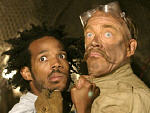
Dorr and his gang, however, seem to break almost every one of the Ten Commandments. Their whole scheme is wrapped up in lying, stealing and killing—to name a few.
Gawain (Marlon Wayans) uses extreme profanity. Probably every foul word conceived was used by him, and done in excess. Gawain also uses a lot of crass sexual humor, and one of the scenes deals with how he slept with one of the casino patrons. There is no sex or nudity, but there is one close up of this girl’s backside as Gawain walks behind her and makes lewd remarks.
Ultimately, it doesn’t feel like the Coens really celebrate the “happy ending” in their films. They use them (i.e., Raising Arizona, O Brother Where Art Thou, Intolerable Cruelty), but it feels like they work within the framework of a moral universe because they know that it’s futile to do otherwise. For this reason, there are truths that can be extracted from their movies.
One truth that can be exemplified is from Proverbs 13:22, which says, “.the wealth of the sinner is stored up for the righteous.” (NAS) Another is from Proverbs 28:13 which says, “No one who conceals transgressions will prosper, but one who forsakes and confesses them will obtain mercy.” (NRSV) This second proverb can be seen in the confrontation when Mrs. Munson proposes a deal to Dorr, including an invitation for he and his friends to attend church with her.
Throughout the story, Dorr and Mrs. Munson seem to go head to head in their ideas about life. One night while they’re relaxing and reading, Dorr discusses the wisdom he gleans from reading various works of literature. Mrs. Munson challenges him and asks him if it’s the wisdom of God or wisdom of man. Dorr acknowledges the merits of the “Good Book,” but concludes with her that there are other good books, too. But, ultimately, it’s Mrs. Munson’s way of life that finally wins out.
While these inferences of good winning out over evil may ring true, the aspects intended to be enjoyed most are the shenanigans of the wrongdoers. (This is true with most Coen comedies). The film does have plenty of authentic humor and another cast of original characters. The entire script is very tight and, as always, genuinely entertaining. For Tom Hanks, it seems he thrives again in his comedic forte, and after the first few minutes you are wrapped up in his character and don’t even think about him as an actor.
This is another well-crafted piece of movie making, but the excessive foul language may deter many away from it. There is also some violence involved, although it is obviously intended for comedy rather than drama.
Violence: Mild | Profanity: Extreme | Sex/Nudity: Minor


[Very Offensive/4½]
[Better than Average/4½]
A great many on this site were offended with the verbal onslaught of foul language, and vulgarity that poured out of Marlon Wayan’s mouth. This is understandable, and quite tiring, it is not the language that Christian’s should condone, or participate in. This being said, I would like to point out that this is a movie about a heist, Casino robbers, out to thieve a safe in a Boat Casino on the Mississippi. The trailers, and various print, and television advertisements make this very clear. The Film also has an “R” rating… The entire premise of this movie is an ungodly one, and centers on a band of desperate criminals, and thieves who are commiting a grand crime!!! WHAT DO YOU EXPECT????? Do you really think people like this would speak politely, and not use foul words, and trash talk? I’m sorry to say, but not in today’s world.See all »
[Average/4]
It does not paint black people in a bad light, think about it, there’s maybe 2 black people in the movie who use that language… and all the other black people (there are quite a few of them) are churchgoers. It was real to the character, and while that may offend some people, I see no reason why this movie is any more offensive then the average R-rated movie. Those are just my thoughts.
[Average/5]
[Extremely Offensive/5]
Moral rating: Average / Moviemaking quality: 4
[Very Offensive/3]
[Very Offensive/1]
My husband actually turned to me and suggested leaving about one-third of the way through (something he NEVER does), but we decided to stay, hoping it would get better. It didn’t. Tom Hanks’ characterization also wears on you about half-way through. Not recommended for Christians who are choosy about their movies (we usually are, but made a bad choice on this one).
[Very Offensive/4]
[Extremely Offensive/2]
[Very Offensive/3]
Well, we learned a lesson… don’t depend on any Hollywood star to reflect your values in their work. An actor of Hanks’ stature lends credibility to this kind of garbage. You will be disappointed as we were with this movie.
We walked out of the movie after about 30 or 40 minutes because of the extremely offensive verbal barrage. The couple sitting next to us walked out at the same time. I’ve been to a lot of movies… this is only the 2nd time I have walked out on one. I don’t claim to know much about writing, but I don’t think it would take much writing talent to come up with the lines we heard in this movie.
[Extremely Offensive/3]
[Very Offensive/3½]
We were all disappointed that Tom Hanks would be associated with something like this, because we have always highly respected him and his movies. I’ve read it’s a funny movie, but we could not have gotten through the vile language to even see humor.
[Extremely Offensive/3]
The movie was a comedy, and most of the supposedly funny scenes I didn’t find to be funny at all (perhaps because many of these scenes were colored by so much of this unnecessary horrible language). Aside from that, the acting did seem good, but this doesn’t really matter (to me at least) when the actors’ material is of very poor quality. In retrospect, I am shocked that Tom Hanks would agree to play in such a movie.
[Extremely Offensive/1½]
The script and screenwriting is poor and you don’t buy into the story at all. Hanks forced southern accent adds to the frustration and gets downright irritating after a while. Although the limited scenes of the southern town and the house interior are visually interesting the movie appears designed with the small screen in mind due to the extensive use of facial closeups. Rent the Guinness/Sellers original it is a true classic.
[Extremely Offensive/1½]
It totally took over the movie, and I am very disappointed with Mr. Hanks in this role. I would not recommend this to anyone who is attempting to live a Christian life. Absolutely worthless.
[Extremely Offensive/1½]
[Extremely Offensive/1½]
[Average/2]
All I can say is… It would have been funny and very entertaining without the trash talk! Why Hollywood thinks we have to have that is beyond me. Give us a break! I know I’m from another generation, but I consider myself as someone who moves with the times… BUT color me “standing still” with this one.
[Extremely Offensive/1½]
Being a Christian, I loved the fact that God triumphed overall in this. All of the bad guys got what they deserved due to the hand of GOD. Irma P Hall, a devoted Christian, got blessed by GOD at the end of the film. Irma P Hall should be an example for other actresses. There are a lot of gospel songs in this film that I hummed when I left the theater. I am surprised that people are leaving the theater during the film. Overall, I enjoyed this movie and plan on buying the DVD when it is released…
[Very Offensive/4½]
This is a legacy of films that goes back to The Treasure of the Sierra Madres and probably further back than that. Greed will kill you. That was the thesis of the Coen’s Fargo from a few years back. This is essentially a tongue-in-cheek version of that movie set in a dark-comedy. I will put it this way, if you don’t like the f-word, don’t go see this movie… is used to an excess in this film almost comedically to show just how stereo typical Marlon Wayans’ character really is. This is a good movie, with a surprisingly moral message…
[Better than Average/5]
[Very Offensive/1]
Within the first minute or two the movie started off (very slow have you) it felt calm, it felt clean, it felt like I was about to sit in the theater for two hours bored to no end. Then they splashed in all the color. It wasn’t within the next 2 mins. that I heard the “f” word used over 20 times (maybe over-exaggerated). Look I’m a guy who likes to give someone the benefit of the doubt, and I am not the kind of person that would walk out of the theater, but I definitely did.
To close my comment, I have to say: There is a real issue if you did not have a problem with the language presented in this film. People are getting very desensitized these days. I myself will first hand say that I may not feel that the occasional swear is wrong, because every movie has a swear in it. Its almost to the point where you just “accept” that a swear in the theater is okay, but this movie definitely took a hard turn here. It saddens me that they made a movie like this… it saddens me that people could actually enjoy this… it saddens me that this is what things are coming to.
[Extremely Offensive/1]

My Ratings: [Very Offensive/4]